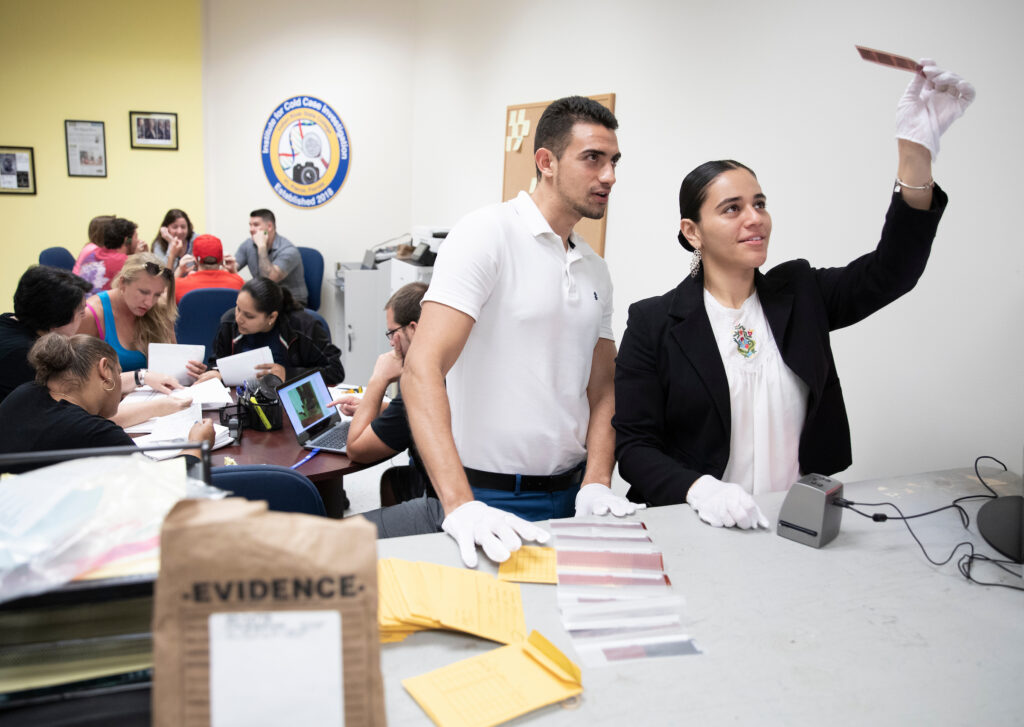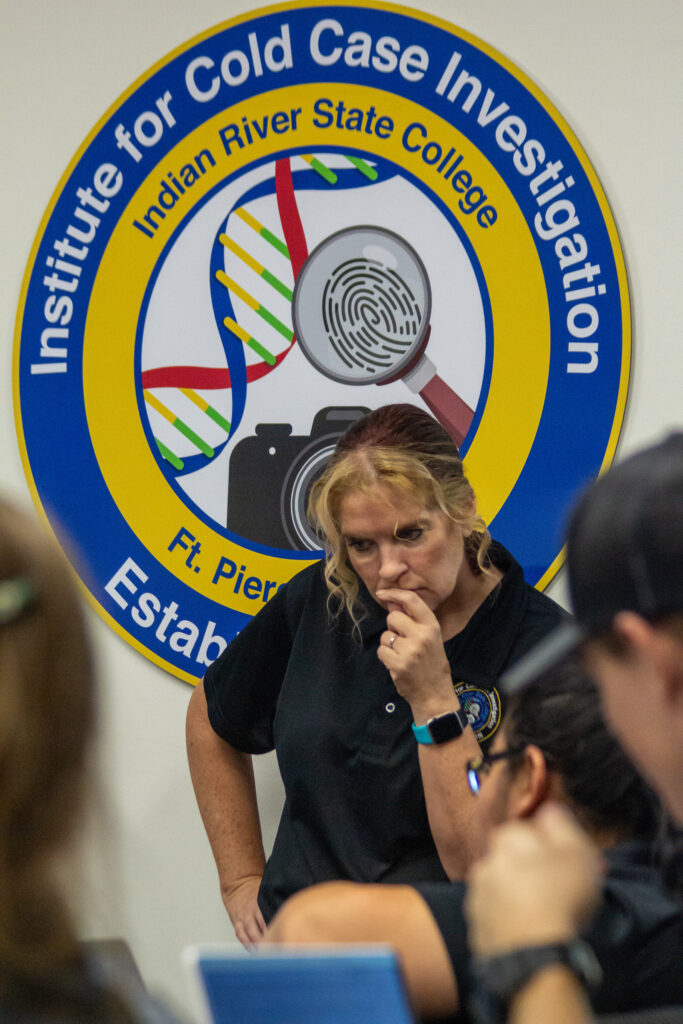The only program of its kind in the country teaches students to think like detectives—and close cases that have stumped law enforcement for years
By: Kathleen Walter
When Autum Clay sits down to work on a case, she’s not analyzing a textbook scenario or watching a crime documentary. She’s poring over actual evidence from an unsolved investigation—crime scene photos, witness statements, decades-old leads that went nowhere. It’s painstaking work that can mean spending weeks stuck on a single detail, then months chasing down what comes next.

Digging into the details. Indian River State College cold case investigation students collaborate on unsolved mysteries, applying real forensic techniques to cases that need a fresh perspective.
You could be stuck on a simple fact for weeks, figure that out, and before you know it, you’re chasing another lead for a month,” Clay explained.
Clay is a student in the Institute for Cold Case Investigations at Indian River State College, the only program of its kind in the country. Founded in 2018 by Dr. Kimberlie Massnick, a forensic criminologist, the Institute gives students something most criminal justice programs can’t: real-world investigative experience working on actual unsolved cases with local sheriff’s offices.

When the trail goes cold, these students warm it back up. The cold case investigation course brings together analytical minds to reexamine unsolved cases using modern forensic methods and collaborative problem-solving.
And it’s working. To date, the Institute has solved, closed, or resolved five cases. Students have helped bring closure to grieving families, identified suspects, and contributed evidence that’s been presented to state attorneys. One case even caught the attention of Kelly Siegler, prosecutor and host of Oxygen’s Cold Justice, who worked alongside the Indian River County Sheriff’s Office, reviewing the suggestions and work done by students alongside the agency. Ms. Siegler then worked directly with the Sheriff’s Office to recommend and follow up on the case and pitch it to the State Attorney’s Office. (The Cold Justice episode aired on Oxygen on October 11, 2025).
A Program Born from a Simple Question
Dr. Massnick didn’t set out to revolutionize criminal justice education. She simply asked herself: what if students could do more than read about investigations—what if they could actually conduct them?

Dr. Kimberlie Massnick leads the Institute for Cold Case Investigation at Indian River State College
In an exclusive interview on IRSC Public Media’s RiverTalk, Dr. Massnick explained how the idea took shape. After speaking at a national conference about cold cases, she realized there was genuine public interest in the topic. She also noticed something troubling: when she asked audiences if they could name a victim of Ted Bundy, no one could. Everyone knew the killer. No one remembered the victims.
“At that moment, my entire life shifted,” she said. “This isn’t about the suspect, the person who did this. I’m going to change the narrative. We are going to talk about who is really important and who needs to be remembered.”
Massnick approached local sheriff’s offices with a bold pitch: let college students review cold case files. Surprisingly, one sheriff jumped at the opportunity. The college awarded her a grant, and the Institute was born.
The very first case they tackled? Solved in a single semester.
Learning from the Old School
The Institute operates as part of Indian River State College’s research methods course—a natural fit, since cold cases are essentially intensive case studies. Students apply everything they’ve learned across their criminal justice curriculum: critical thinking, criminological theory, investigative techniques, ethics, and evidence analysis.

Students in the Institute for Cold Case Investigation at Indian River State College work with Indian River County Sheriff’s Office detectives
But what makes the program truly unique is the mentorship component and the actual sharing of the complete case file. Veteran detectives with 30 or 40 years of experience work directly with students, sharing insights that can’t be found in any textbook. These detectives are often the detectives originally assigned to the case or detectives currently with the agency.
Hannah MacDonald, a former student who appeared on RiverTalk alongside Dr. Massnick, recalled discussing with detectives how the work follows you home—how you start dreaming about cases, how the details infiltrate your subconscious. “You work so much with this stuff and you start thinking about it in your off time,” she said. The detectives taught her how to cope, how to decompress, and how not to become consumed by the darkness.
Chandler Sillaway, another Institute alum, remembers the moment a detective handed him a sticky note with two words written on it: probable cause. “I’m thinking, oh, this is serious,” Sillaway said. “Probable cause is what you need for an arrest. And that’s exactly what we were reaching for.”
Technology Meets Experience
Part of the program’s success comes from a simple fact: today’s students grew up with technology in their hands. What might have taken detectives days or weeks to uncover 20 or 30 years ago—tracking down public records, cross-referencing voter registrations, finding addresses—students can now do in minutes.

Future investigators at work. Students in the cold case investigation course analyze evidence and explore new angles on unsolved mysteries.
“These guys were born with computers in their hands,” Dr. Massnick said. “They can do things and think of things and go down rabbit holes that would have taken law enforcement a lot longer to do.”
But technology alone isn’t the answer. Dr. Massnick emphasizes that students must learn to “follow the evidence,” not their theories. As Sillaway put it: “It’s easy to go down a rabbit hole in your own theories. When you have detectives looking over your shoulder and you have Dr. Massnick looking over your shoulder as well, even though it’s hard to follow the evidence, you need to.”
The program also teaches students that investigations require collaboration. Some students discover they’re better suited for fieldwork; others thrive behind a computer organizing data and tracking leads. Both skill sets are essential.
Filling a Critical Gap
Louis Caprino, former FBI agent and now Dean of Public Service Education at Indian River State College, says Dr. Massnick’s work goes far beyond the classroom. She’s preparing students to succeed in law enforcement careers at every level—and at a critical moment.
Across the country, police departments are hemorrhaging experienced detectives. Since COVID-19, many veteran investigators have retired early, leaving departments struggling to fill the gap. The Institute helps address this crisis by producing graduates who can confidently answer the question every employer asks: Do you have experience?
Institute graduates have been hired by federal agencies like the Office of Special Investigations and the Department of State. Others have joined local law enforcement or started their own investigative businesses. Some, like Hannah MacDonald, are pursuing paralegal work specializing in criminal law. Chandler Sillaway is completing his master’s degree and pursuing federal investigations.
“They’re much more likely to be employed quicker,” Dr. Massnick said, “simply because they are able to answer that question, do you have any experience? And now they can say, not only do they have experience in investigation, but they can turn around and say, we’ve learned how to use this piece of equipment. We’ve learned how to bring you into the 21st century.”
More Than Just Solving Cases
For current students like Arianna Crespo and Cassidy Koch, the Institute has been transformative. Crespo says the program teaches you that “it could be anyone around you”—meaning detectives must always be willing to consider every possibility, no matter how uncomfortable.
Koch, inspired by crime shows and her mother’s interest in investigations, says she’s caught “the bug” for detective work and continues to stay involved even after completing the class.
But Dr. Massnick is clear: this work isn’t just about closing cases or launching careers. It’s about something deeper.
“When you see those crime scene photos, those are real people,” Chandler Sillaway said. “You have a person’s life in your hands and you’re trying to get justice for them.”
The Institute currently has two more cases moving forward. One has been presented to the state attorney’s office. Another involves a suspect who’s been identified but is out of state, making an arrest logistically complicated. And then there’s the case that could rewrite everything: five unsolved cases that appear to be connected to the same suspect.
If students successfully tie those cases together, they’ll be the only students in the country to have caught a serial killer.
“People don’t think it can happen in your backyard,” Dr. Massnick said.
At Indian River State College, students aren’t just learning about criminal justice. They’re practicing it. They’re bringing closure to families who’ve waited years—sometimes decades—for answers. They’re honoring victims whose names have been forgotten. And they’re proving that with the right training, mentorship, and determination, fresh eyes can solve even the coldest cases.
Learn more about the Institute for Cold Case Investigations and Indian River State College’s Criminal Justice programs at irsc.edu.
For media inquiries, email the Indian River State College Office of Public Information: pio@irsc.edu.